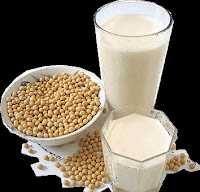
Is soya bean the next olestra as far as health fads go?
IT'S not a top snack-on-thehoof yet. But Soyjoy's gonna be a sure shot reality in India as leading snack makers churn out mouthwatering delicacies which will not only tickle your tastebuds but also provide the much-needed nutrients — absolutely cholesterol free.
Check the menu yourself: soya bhujia, rusk, nuts, flakes, cereals, flour, papads, flavoured milk, normal milk, tofu and now even noodles — you can just go-ahead and snack out to the last bit without worrying or feeling guilty. And the taste? Put all your fears aside, the puffed/fried offerings just about mimic the taste which you have cravings for.
Of course, the products have taken a long time to hit the Indian market - - the barrier being its bland taste. Indians somehow couldn't develop a taste for it, so what if Mahatma Gandhi had explained the benefits of soya to the people, way back in 1939. Although soya nuggets and beans were introduced in the Indian market some 30 years ago, some early attempts to produce soya milk failed mainly because taste and odour remained a deterrent.
Cut to the present, and one finds a changed situation. Interestingly, the pull is now coming from consumers as health consciousness increases and there's more focus on health and nutrition. And seeing the preference, companies like Godrej Agro, Nestle, Amrit Agro, Premier Nutrients, Solay and Ruchi Group have realised the need to bring about innovations so as to make soya more popular and then make the killing. The results are impressive —the consumption of Soybean meal in India was about 6 lakh metric tonnes in 1996. Today, it is over 1.2 million metric tonnes. The consumption of modified soya milk, too, has increased from 20 lakh litres in 2000 to 70 lakh litre in 2004. And mind you, this is just the tip of the iceberg. The figures could be mind-boggling if the soya snacks take on the market in a big way.
This looks logical if the immense health benefits are taken note of. Says Dr Suresh Itapu, technical director, human nutrition, American Soybean Association (ASA): "Soya is a wonder product. It is the richest source of protein, has little starch or fat, it's low on sodium and rich
in essential vitamins. Soya is also a drought-resistant crop and can grow anywhere.
Of course, it's taste is bland and the cooking characteristics are different. But seeing the benefits it provides in a variety of diseases and business opportunities it offers, food companies should come forward to develop tastier products and market them aggressively."
Soybeans, a product of a leguminous plant, have long been known as healthful additions to our diet and perhaps the only first class protein of vegetable origin. Soya proteins provide all the essential amino acids needed to fulfill human nutritional requirements for growth, maintenance, or physical stress. One of the most important and unique features of soybean is that it contains all the three macronutrients — proteins, carbohydrates and fats required for a good nutritive diet. As compared to other legumes, which contain 20-25% protein, soybean contains 38%- 40% protein. It is also known to be a good source of vitamins and minerals. Says Kavitha Reddy, nutritionist and consultant, ASA: "Since the Indian population is predominantly vegetarian, their diet is often lacking in terms of quantity and quality of protein. Even non-vegetarians do not consume animal products daily in sufficient quantities. Thus, soya can easily meet the protein requirements of a vegetarian diet. Further, researchers worldwide have confirmed various therapeutic benefits about the product."
The emerging health benefits of soya consumption range from lowering risk of heart disease and certain types of cancer to alleviating menopausal symptoms and enhancing bone strength. After reviewing almost 50 scientific publications, the US Food and Drug Administration (FDA), issued a health claim that "consumption of 25 gms of soya protein per day with diet low in saturated fatty acids may reduce the risk of health diseases by reducing cholesterol." Exactly after one year, the American Heart Association endorsed the FDA health claim. Says Dr Ambrish Mithal, Senior consultant, endocrinology at I ndraprastha Apollo Hospital, New Delhi, and member, WHO Global Task Force on Osteoporosis: "Nutrition is an important factor in diabetes treatment. Soybeans contain plant estrogen, are low in saturated fat, contain no cholesterol, and have a moderate amount of alinolenic acid, making soya an excellent choice for a hearthealthy diet. Kidney diseases are a common long-term complication of diabetes. Soya protein does not cause hyper filtration and is significantly b e t t e r than animal protein in preserving renal function. The protein requirement of a person with diabetes increases and this can be met with ease by adding soybeans and soya products to the diet. Not only this, soya protein helps reduce cholesterol and controls blood sugar levels."
This is all the more important in India where more than 19 millions have been diagnosed with diabetes and the figure is expected to rise to 57 million by 2025. WHO states that India is fast becoming the world diabetes capital. The increasing rate of diabetes in India has been put down to stress, lack of exercise and a diet high in fat.
As for cholesterol and heart diseases, soybean being the natural alternative to many cholesterol-lowering drugs helps reduce the chances of cardiovascular diseases, which today is the number one cause of death in urban India.
Again, researchers have found a link between soya consumption and reduced risk of certain types of cancers, especially breast and prostate. Isoflavones, phytochemicals found in soya products have shown to be anti-carcinogenic.
Osteoporosis is another case in point. Says Dr M i t h a l : "This disease is prevalent in ageing women and even in men. It causes bones to become porous and brittle from the loss of calcium and other minerals. According to a study, 30-40% of the women and 13% men have life time risk of fracture due to osteoporosis. Soya protein reduces these risks as it causes less calcium excretion from the body as compared to animal protein (particularly in the West), thus helping in development of bones. In fact, it has been scientifically proved that children who consume soybean products show a higher increase in memory power, weight, height and considerable rise in their haemoglobin level as well." However, excess use of soya-based formulae can affect thyroid functions, he warns.
Soya also relieves menopausal symptoms. Epidemiological data show that Asian women suffer less from hot flashes and night sweats compared to Western women. These symptoms of menopause are caused by low estrogen levels. Estrogens play a role in the body temperature control. Soya isoflavones can through their estrogen-like effect control these menopausal symptoms.
Indeed, soya consumption has grown by over 200% in the last six years in India. Work is on for promoting soya use in poultry, dairy and aquaculture sectors. KEEP THE DOCTOR AWAY



